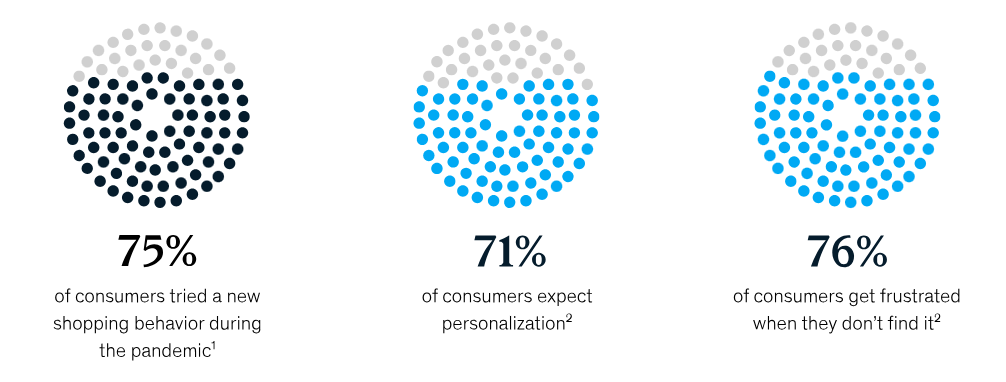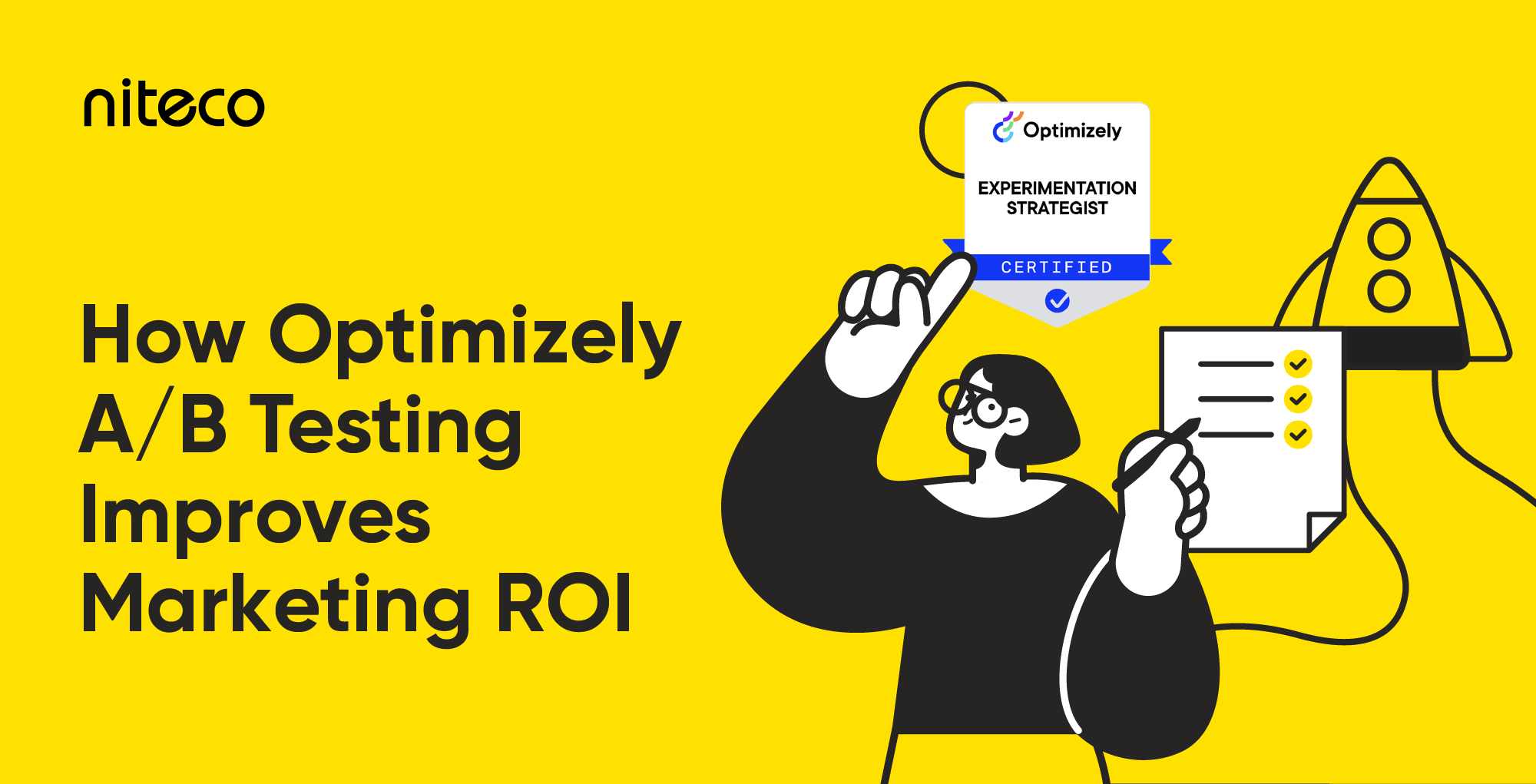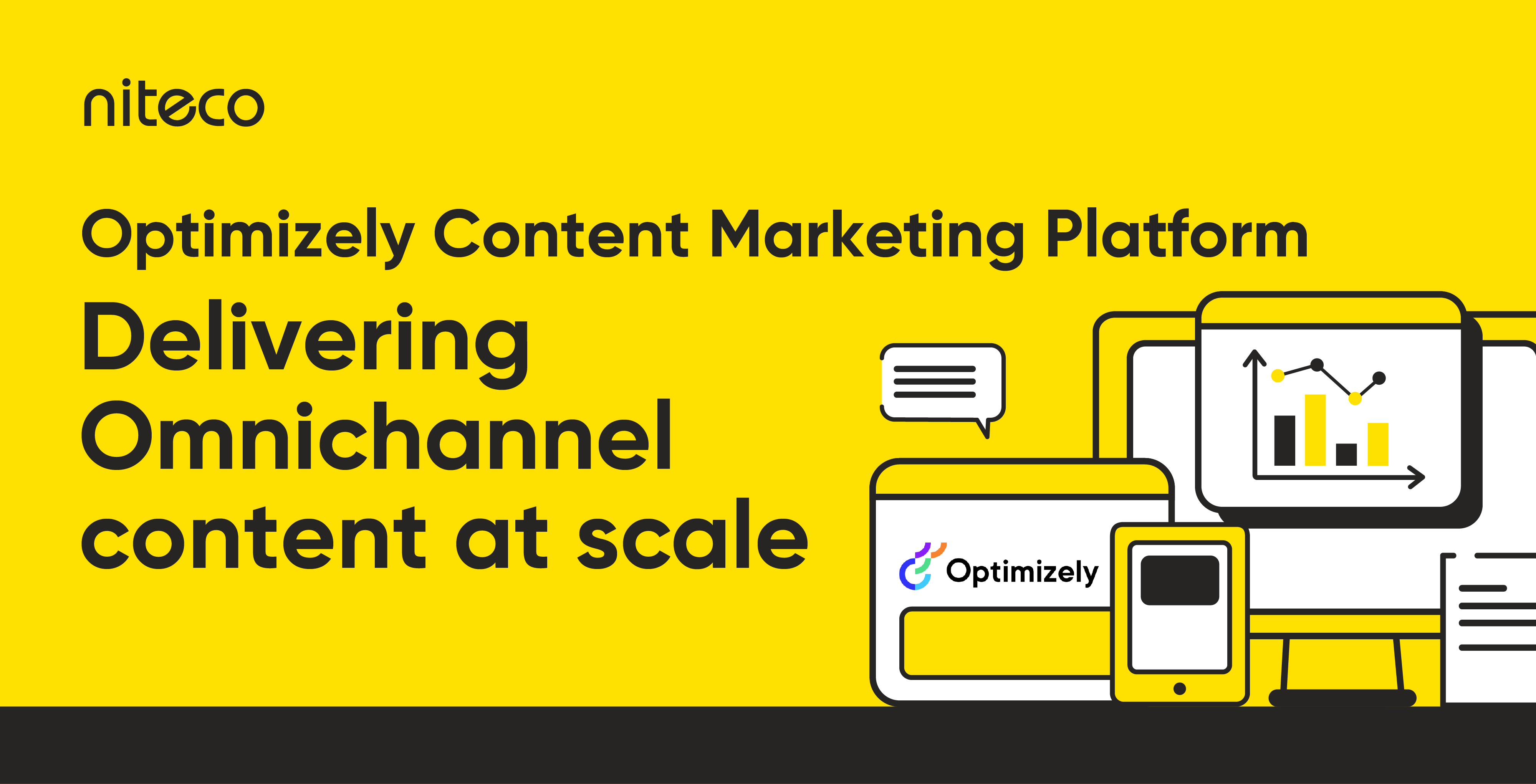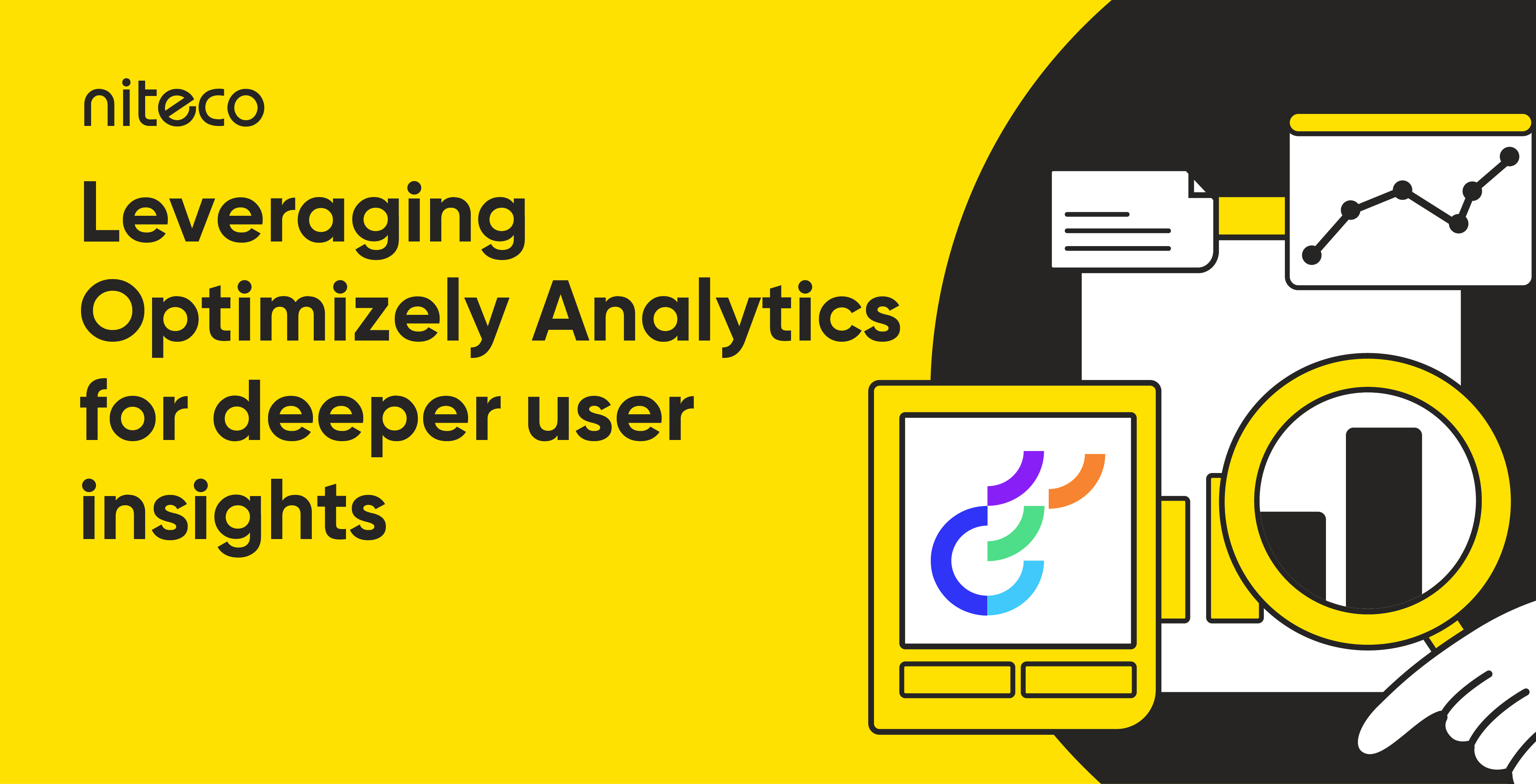Imagine living in a world where your website - your digital storefront - has an AI as your tireless employee. What a beautiful life that would be! No more late nights answering customer inquiries or draining your brain like an overworked sponge just to create content for hundreds of pages.
This isn’t just a figment of your imagination, it’s an evolving reality. Integrating AI into Commerce can transform ordinary websites into high-performing platforms with enhanced user experience. Say goodbye to the stress of customers needing quick responses, personalized experiences, and seamless interactions. More efficiency for less effort - doesn’t that sound appealing?
Let’s dive into how AI can elevate your website’s performance through customer engagement by exploring the top 4 use cases and the platforms that can make this transformation possible.
How AI transforms websites into high-performing client touchpoints
Personalization at scale
By understanding individual preferences, browsing habits, and purchase history, AI can now provide a higher level of personalized experience to customers. Tailored content, product recommendations, and promotions can increase engagement, foster brand loyalty, and ultimately drive conversions.
Real-time customer support
With the integration of AI-powered chatbots, websites can provide instant customer support 24/7. These chatbots can handle common inquiries, guide users through the site, and resolve issues without human intervention. By ensuring immediate assistance, businesses can significantly reduce bounce rates and enhance overall customer satisfaction.
Predictive analytics for better decision-making
By utilizing AI-driven predictive analytics, businesses can forecast trends, understand customer behavior, and make data-informed decisions. This capability allows companies to adjust their strategies in real-time, optimizing marketing efforts and inventory management to align with customer demand.
Enhanced user experience
AI can analyze user interactions on a website to identify pain points and areas for improvement. By leveraging this data, businesses can optimize website design and functionality, creating a seamless user experience. Features such as dynamic search results, personalized landing pages, and adaptive interfaces contribute to keeping users engaged and satisfied.
Top 4 AI use cases and platforms for enhancing customer engagement
Now that we understand how AI transforms websites into high-performing platforms, let’s delve into the top 4 AI use cases that directly enhance customer engagement. Each of these use cases not only improves user experience but also drives business growth, ensuring that your Commerce strategy remains competitive in today’s digital landscape.
1. Leading innovations for better customer experience
One of the most obvious use cases of AI in enhancing user experience is empowering innovations that transform how solutions are created and improved. These innovations act as backstage heroes: boosting productivity, enhancing quality, and enabling better results at scale to deliver exceptional end-user experiences.
Among the many areas where AI is making a difference, digital experimentation stands out as a prime example. A highlight in this space is Sample Size Genie, the AI-powered tool that won the grand prize at Optimizely’s Opal AI Hackathon. The tool automates critical steps in experiment planning - such as calculating sample size, setting baselines, and estimating timelines. This means marketers and analysts can shift their focus from manual calculations to running more impactful tests and continuously improving customer journeys.
Not to mention our AI-powered Optimizely Upgrade Accelerator - the very first AI accelerator of its kind on the market. It enables teams to upgrade Optimizely CMS 12 and Commerce 14 in half the usual time: 8 weeks for CMS and 12 weeks for Commerce, while guaranteeing peak performance and zero downtime. For businesses, that means faster time to market, reduced costs and effort, and more time to focus on what truly matters: delivering better customer experiences. Discover how we accelerated the Optimizely upgrade (using AI Accelerator and Optimizely AI) for Primitives by Kathy, a leading US home décor brand.
2. Automating customer support with chatbots
Another common and must-have AI use case in any enterprise is AI-powered chatbots.
According to the Zendesk CX Trends Report, 51% of consumers prefer interacting with bots when they need immediate service. AI-powered chatbots can provide instant, automated responses to common queries, ensuring customers receive the help they need at any time, day or night. This not only reduces response times but also frees human agents to focus on more complex, high-value tasks.
While there are many platform options for AI-powered chatbots, we have found Google Dialogflow is one of the best choices. Known for its advanced natural language processing (NLP) capabilities, Dialogflow enables our chatbots to offer human-like, intuitive interactions. It also supports features like keyword recognition and contextual learning, allowing the bot to continuously improve over time.
At Niteco, we have successfully implemented chatbots powered by Google Dialogflow for Electrolux APAC. Our chatbots feature a user-friendly decision tree interface, allowing users to select appropriate options throughout their journey. These interactions can lead to various actions, such as navigating the website, opening a webpage connected to the brand’s website, initiating a 1-1 live video call, or linking to Twilio Live Chat services. As a result, the Electrolux chatbot helped reduce wait times and improve customer satisfaction, showcasing the effectiveness of AI-driven customer support automation.
3. Delivering tailored content through AI-driven personalization
A McKinsey’s research shows that 71% of consumers expect personalized content from businesses, and 76% feel frustrated when their interactions are not customized to their needs. It shows that personalization is no longer just a buzzword, it is an essential to any Commerce business. Sharing the same inclination as McKinsey’s report, personalization has proven to be a significant growth driver, as proven by our successful personalization project with Electrolux. The brand saw doubled conversion rate after everything was settled.

Source: McKinsey & Company
And with the unstoppable growth of AI, personalization has been taken to the next level, escalating both benefits for the consumers and the business. Particularly, AI-driven has led to the rise of omnichannel hyper-personalization, where customer interactions are seamlessly tailored across various platforms, responding instantly to their behaviors. A report from the IBM Institute for Business Value reveals that 60% of consumers are interested in using AI applications while shopping.
At Niteco, we have always found the most innovative ways to implement personalization. Among these, we leverage the power of Optimizely AI, alongside external LLMs in Azure Databricks, to deliver advanced AI-driven personalization for our clients.. Platforms like Optimizely AI, including features akin to those found in Optimizely Opal, are designed to generate customized content and experiences based on rich customer data and segmentation. By integrating Optimizely CMS with these powerful AI capabilities we ensure that each user receives relevant information tailored to their preferences, leading to higher engagement and satisfaction.
4. Enhancing content creation and marketing
Everybody knows generating content is one of the greatest strengths of AI. At Niteco, we have implemented AI in ChatGPT, a versatile tool that excels in developing high-quality content. It can be used for various content creation tasks, including product descriptions, blog posts, and marketing materials.
We leveraged ChatGPT for several marketing projects, particularly in SEO and email marketing. For SEO projects, we use AI to conduct keyword research, write SEO briefs, and generate SEO content. In email projects, ChatGPT helps us produce engaging and persuasive email copy and review existing copy provided by clients. This approach streamlines the content creation process, ensuring high-quality, on-brand messaging that meets the diverse needs of our clients.
Beyond general AI tools like ChatGPT, platforms like Optimizely AI are specifically designed to optimize digital content at scale, integrating seamlessly with your commerce platform for even more targeted and effective marketing. This enables advanced features for content generation, personalization, and SEO optimization directly within your content management system, ensuring your content is not only creative but also highly performant.
Discover the full spectrum of AI-powered solutions we deliver to transform your Commerce strategy. Visit our dedicated AI services page.
Check Out Our AI Services page
We have shortlisted 4 ways on how to use ChatGPT in your digital marketing effort to make the most out of the tool. Check it out now!
AI use cases in Commerce: Transforming user experience for high-performing websites with Niteco
AI is revolutionizing the Commerce landscape, offering powerful tools to enhance user experience and drive business growth. By implementing AI solutions like chatbots, personalization, and content generation, businesses can transform their websites from basic digital storefronts into dynamic platforms that engage customers and foster loyalty.
At Niteco, we are dedicated to helping our clients harness the full potential of AI to elevate their Commerce strategies. Our expertise in deploying advanced technologies ensures that businesses not only meet but exceed customer expectations, resulting in higher satisfaction and increased conversion rates.
We don't just adopt AI - we innovate with it. Our Sample Size Genie (built on Optimizely Opal AI) and AI-powered Optimizely Upgrade Accelerator are just a few of our real-life AI use cases. They are showcasing our proactive approach to AI and commitment to driving tangible business results from practical AI innovations.
If your business is beginning its AI journey or looking for the best place to start, get in touch with us. Our team of AI-trained experts is ready to help you turn ideas into impactful outcomes.
FAQs
AI analyzes customer data (browsing, purchase, preferences) to create hyper-personalized experiences like recommendations, tailored content, and promotions. This real-time adaptation significantly increases engagement and conversions.
AI chatbots provide instant, 24/7 support, drastically reducing response times and handling routine inquiries. This frees human agents for complex tasks, boosting efficiency, lowering costs, and enhancing overall customer experience.
Optimizely AI (including features similar to Optimizely Opal) integrates AI directly into content management and experimentation. It helps generate optimized content variations, personalize content at scale for segments, and improve SEO, ensuring highly effective and relevant content.
to transform your business and drive results?



